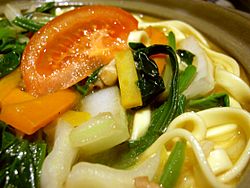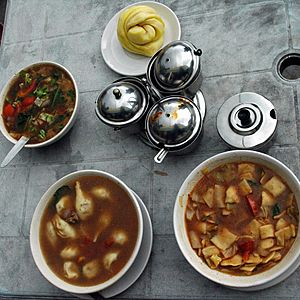Thenthuk facts for kids

Thukpa - a type of noodle soup, like Thenthuk
|
|
| Type | Noodle soup |
|---|---|
| Place of origin | Tibet |
| Region or state | Tibet, Qinghai, Sichuan |
| Main ingredients | Wheat flour, vegetables, meat (mutton or yak) |
Thenthuk (Tibetan: འཐེན་ཐུག་, Wylie: then thug) is a yummy noodle soup from Tibet. It's a type of thukpa, which means noodle soup. People in Tibet, especially in a region called Amdo, often eat Thenthuk for dinner or sometimes lunch.
The main things that go into Thenthuk are wheat flour dough, different kinds of vegetables, and usually some pieces of mutton (lamb meat) or yak meat. These days, you can also find Thenthuk made only with vegetables, which is a great option for everyone!
Contents
How to Make Thenthuk
Making Thenthuk is a fun process that involves a few steps. First, you prepare the soup, and then you add the special noodles.
Getting the Soup Ready
To start, the cook mixes the flour to make the dough. Then, they chop up all the vegetables and meat into small pieces. These ingredients are then put into a pot with water and boiled to create a tasty soup base.
Adding the Hand-Pulled Noodles
Once the soup is boiling and the vegetables and meat are cooked, it's time for the noodles! The cook takes the dough, flattens it out, and then pulls it by hand. They then cut off pieces of the dough right into the hot, boiling soup. This is how the noodles get their unique "hand-pulled" shape. As soon as all the noodles are in the soup, the Thenthuk is ready to be served and enjoyed!
Thenthuk in Nepal
In Nepal, you can find a version of thukpa (Nepali: थुक्पा) that is a bit different from the Tibetan one. The Nepali version often has chili powder and special spices called masalas. It also uses noodles with a soup made from gram and peas. This gives it a hot and spicy flavor!
You can find a very typical Nepali thukpa in the Sankhuwasabha district. However, in places like the Kathmandu Valley, the thukpa is often very similar to the one found in Tibet. This is because many Tibetan refugees have moved there and brought their cooking traditions with them.
See also
 In Spanish: Thenthuk para niños
In Spanish: Thenthuk para niños
 | Jessica Watkins |
 | Robert Henry Lawrence Jr. |
 | Mae Jemison |
 | Sian Proctor |
 | Guion Bluford |


